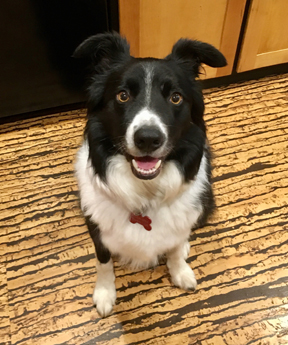German shepherd is first canine in U.S. with confirmed SARS-CoV-2 infection

Laddie 288

VIN News Service photo
Laddie, a 5-year-old border collie who lives near Seattle, lost his owner to COVID-19 in April. Laddie is healthy, showing no signs of infection by the novel coronavirus, and has since been adopted by a VIN News Service staff member. While a few animals have contracted the virus, authorities consider the risk low of animals transmitting it to people.
A sick German shepherd in Long Island, New York, is positive for SARS-CoV-2 and is the first canine confirmed to have the novel coronavirus in the United States, federal authorities announced today.
The news from the U.S. Department of Agriculture Animal and Plant Health Inspection Service comes nearly a month after reports that a pug in North Carolina tested positive for the virus. Scientists now say the virus was never isolated in that case.
The German shepherd is from a household in which one person tested positive for COVID-19, and another had symptoms consistent with the disease, before the dog became sick, exhibiting signs of respiratory illness. The pet is expected to recover fully and does not pose a significant health threat to others, according to the USDA.
"We are still learning about SARS-CoV-2 in animals, but there is currently no evidence that animals play a significant role in spreading the virus," the agency said. "Based on the limited information available, the risk of animals spreading the virus to people is considered to be low. There is no justification in taking measures against companion animals that may compromise their welfare."
Samples from the dog were taken last month by a veterinarian, who ordered a test for SARS-CoV-2 from Zoetis Reference Labs in Louisville, Kentucky. When a test using polymerase chain reaction yielded a positive result, the lab notified government officials. The National Veterinary Services Laboratory in Ames, Iowa, confirmed the finding.
According to the USDA, a second dog in the household showed no signs of illness, but antibodies against SARS-CoV-2 were identified in that dog's blood, indicating it was exposed.
"SARS-CoV-2 infections have been reported in a small number of animals worldwide, mostly in animals that had close contact with a person who was sick with COVID-19," the USDA stated. "At this time, routine testing of animals is not recommended."
While tests for SARS-CoV-2 are commercially available to veterinarians, the government aims to serve as the gatekeeper for testing animals. Today's USDA statement reiterated a stance it's articulated earlier: "State and local animal and public health officials will work with USDA and the U.S. Centers for Disease Control and Prevention to make determinations about whether animals should be tested for SARS-CoV-2 ..."
Reflecting an evolving understanding of the novel coronavirus, which was first identified in late 2019, the USDA stated: "It appears that people with COVID-19 can spread the virus to animals during close contact. It is important for people with suspected or confirmed COVID-19 to avoid contact with pets and other animals to protect them from possible infection."
In the past six months, more than 6.3 million people have contracted COVID-19. In that time, a handful of animals have tested positive for the virus responsible for the disease: a few pet cats and dogs in the U.S. and abroad; tigers and lions at the Bronx Zoo; and mink on farms in the Netherlands. In most instances, the animals are believed to have contracted the virus through contact with infected people. However, Dutch authorities suspect that mink transmitted the pathogen to at least two farm workers.
The implications of animals contracting the virus are not fully known. According to the CDC: "... [T]he risk of animals spreading COVID-19 to people is considered to be low," according to the "limited information" available to date.
Dr. J. Scott Weese, an infectious disease veterinarian at the University of Guelph's Ontario Veterinary College, doesn't think the case of the German shepherd in New York "changes anything" in terms of how to stave off transmission, but it serves as a reminder that SARS-CoV-2 is an interspecies disease that needs more research.
Zoonotic transmission, he said, is rare but possible, such as is suspected at the Dutch mink farm. He noted that veterinarians, too, are at risk for infection because they're in regular contact with animals, including ones that might have had contact with people who have COVID-19.
Risks to pet owners are negligible if they follow common-sense measures, Weese said.
"If you socially distance your animal from other people, it's not going to get the virus unless it gets it from you or your family," Weese said. "It can move both ways, but it's almost exclusively human-to-animal."
He added: "The fact that this dog has the virus just indicates a need to keep studying it. We need to figure out the range of species that can be infected."
USDA said it will post all confirmed cases of SARS-CoV-2 in animals and will announce each time the virus is found in a new species.